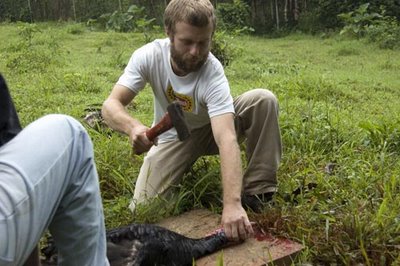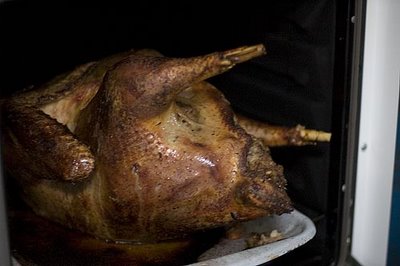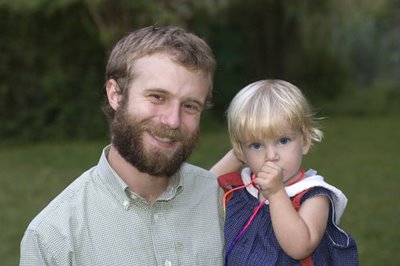Back to the story. I'm not really sure how it all began, but somehow Scott and I were nominated to provide one of three turkeys for the Thanksgiving Day celebration. It's one of those things like riding in a car looking out the window. Life is passing you by, you daze out of the reality around you for one second, then you snap back to and all of a sudden you're providing the thanksgiving turkey. Guess I should stop dazing J.
Anyways, I was more than ecstatic to be on the turkey team, because that meant something new and adventurous, even though I wasn't sure at the time all that it would entail. This brings us back to Wednesday. We had our houseworker out in the village Wednesday morning asking around and finding the locals who had turkeys. Of course, word gets out that the Mujungu are looking for turkeys and WHAMO, price inflation like you wouldn't believe. But what can you do? It's a difficult thing to negotiate a fair price among a people that live day to day barely putting matoke, posho and g-nuts on the table.
We went out in the afternoon to track down some of the turkeys that they had located earlier and negotiate with their owners. It was a wet and drizzly affair. We found someone who had two Thanksgiving Day worthy sized turkeys. Of course finding the owner didn't mean that it was a simple transaction - money for turkeys. The locals here don't pen up or fence in their animals. They just know which ones are theirs and they track them down when they are ready for them (at least this appears to be how it works). So we went all over this section of town, in the misty rain tracking these turkeys and low and behold they were by the road where we began. And this was where having a Ugandan backup (a.k.a. Ingambeki our houseworker) was prime. He went straight up to the turkey, grabbed that bad boy by the tail feathers, held on for dear life while the thing went berserk and then finally lassoed him in by grabbing it on the neck. I would put my money on Ingambeki in a turkey rodeo. I'll give you 50 to 1. He is boss. We did this two more times, totaling three turkeys for the evening. We then brought them home to roost in the pasture with DMC (Dairy Milk Cow, a.k.a Dr. Myhres' Cow). Side note – Publix has nothing on milk straight from the beast (yes, of course we pasteurize it).
It's Thursday morning. The sleep was still in our eyes, but we knew that the time had come. It was Thanksgiving Day, and there must be Thanksgiving Turkey. We made our way over to the Myhre's house finding them ready for the morning's task. We found the turkeys where we had left them, oblivious to the oncoming peril. Cameras were ready. The video tape was rolling. Baguma, the Myhre's houseworker put on a clinic by making quick work of the first turkey with a ponga (a machete'). Then it was my turn. My stomach quickly turned over on itself. I briefly thought of turning back, but I had put myself to the task. There were people watching. I would not allow it.
Instead of a ponga, I decided to use a hatchet, thinking that I could make quick work of it with one fell swoop. Lesson number one: when you see a local do something in a certain way and they have done it many times, maybe you should try their method. Six strikes later, the deed was done. The turkey was beheaded and the observers were bespeckled with blood. (upon later consideration, my method was the least agreeable to the observers for that very reason).

After killing the turkeys, the houseworkers helped by de-feathering them – a laborious process that they made pretty quick work on. I am very grateful for their help in that.
Now we enter the surgical theatre. The scene is Dr. Myhre and his novice surgical apprentice (that would be me). The tools are a kitchen knife, surgical gloves, two number 10 scalpel blades, and two surgical clamps (I'm not making this up – I've got pictures). The first order of business was to watch (there's a saying the medical community that to know something you must first watch one, then perform one, then teach one – that was my first lesson). One turkey "cleaned out" to say it gently. Then lesson two – the appropriate way to don surgically sterile gloves without contaminating them. For some weird reason I now wish that you had to use surgically sterile gloves more often in life so I could use this knowledge. But I digress. I'm not sure the level of detail that you are interested in reading at this point, but let's just say that I had my hands fully immersed in both ends of the turkey at some point or another, if you know what I mean. At one point, with my hand deeply immersed in the process of cleaning, the turkey emitted what sounded like gas leaving the rear area (to say it nicely). Of course I immediately found what action caused this and proceeded to amuse all males present for several minutes.

We finished the cleaning process, or autopsy as we were by then calling it and came to the conclusion that the cause of death was decapitation in an obvious case of birdicide. With three cases on our hands within a relatively short time span it's obvious that we had a serial bird killer on our hands. We notified the appropriate authorities.
At this point you are probably saying to yourself: "man that sounds like a really long day" or you are saying "I am completely grossed out." Either way, we hadn't even started to cook the thing yet. And not to mention, what single 23 year old male even knows how to cook a thanksgiving turkey (with the exception of Danny Rohan whom I personally know and I also know that he can deep fry a turkey like it's his job – one day maybe I can be like him).
So the turkey had to cook all afternoon and even then the thing didn't get internally hot enough to satisfy the poultry requirements. This was probably due to one or both of two reasons: one being that our oven door doesn't seal well and the other being that the temperature markings have all warn off the knob. We are not really sure what temperature that we were cooking the thing at. Fortunately for us and for Thanksgiving Dinner we were able to "top it up" at the house that we were having the dinner at. (yeah, by the way, you don't "top it off" in Uganda. You "top it up." Makes more sense actually, but it sure is weird to say).
 (The Final Product!)
(The Final Product!)Thanksgiving dinner was wonderful; there were thirty of us around four tables that had been made into a giant square. After dinner we had some thanksgiving entertainment in the form of singing, kids reading poetry that they had written about thanksgiving and a film short that scotticus took of the kids the same day. All in all, it was a wonderful day and if I could have been anywhere I would have been with my family in Jacksonville, but Bundibugyo was definitely a good substitute.

(Beauty and the Beast. a.k.a. Savannah and Me)
Thanksgiving this year gave me a really good opportunity to reflect on what I am truly thankful to God for. I think a large reason why is that when you are living in another culture, it gives you a good lens to look through to see your own culture and blessings. I'm very thankful for the family that God has given me – supportive of me being here, tolerating only speaking on what is normally 20 - 30 minutes once a week and just so loving it's unbelievable. My family and the families of the Babwisi people stand in stark contrast. I'm also very thankful to God for my education (man I never thought I'd say that when I was in school) and for the opportunities that I have because of that. Here there is not much employment or opportunity. Finally, I'm very thankful to God for my salvation in Jesus Christ and the hope that comes with that. I don't mean that to sound cliché or the "oh he has to say that, he's a missionary," but when you are surrounded by a lot of despair, a lot of poverty, a lot of hunger and a lot of addiction to the "quick fixes" like alcohol you can really tell the difference of what it means to live with true hope and what it means to have no hope. The hope that comes with Jesus Christ redeeming all things is unsurpassable.

(Dinner with everyone around the Table)

1 comment:
Post a Comment